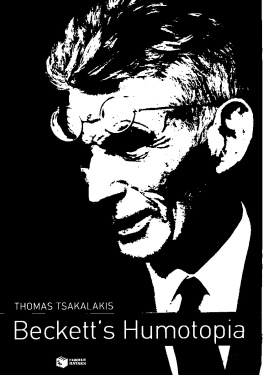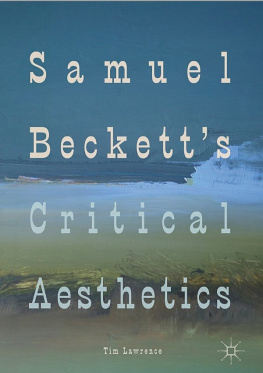THOMAS TSAKALAKIS
Becketts Humotopia
INTRODUCTION
The PRESUMPTIVE, and hopefully not presumptuous, proposition put forth in this monograph is that Samuel Becketts tragicomedies constitute exemplary artistic manifestations of what we herewith name Humotopia. One possible terminus a quo of a theory that would explicate our coinage may be formulated as follows: Humotopia is an immanent topos at one remove from immanence, with humor as its emergent property; hence the compounding. It is an incommensurable Erewhon, signifying at once the originarynowhere and the displaced, disguised, modified and always recreatedhere-and-now (Deleuze xix). Humotopia is a stochastic locus whose contingent flux reflects the differentiated multiplicity which is the resultant of the interactions between concretely existent human beings. In a provisional definition of Humotopia, it could be added that it is irreducible to a schema, although it critiques, informs and transforms mental constructs just as much as it is critiqued, informed and transformed by them. Each of these contentions is bound to occasion a multitude of questions. Where is this topos to be found? What type of humor inheres in it? Why humor and not irony (or satire, parody and so forth)? How is Becketts drama pertinent to all this?
Borrowing loosely from the terminology of non-Euclidean geometry, we might maintain that Humotopia is a hyperbolic plane for which there is no equation and whose shapes are not recognizable prima facie, but which also pervades the entire spatial extension, as well as the temporal duration, of all human puny exploits (Beckett, Three Dialogues 139). It is a destabilized and destabilizing space, whose topography is non-dialectizable and which saturates human reality both from within (cognitively, conatively, affectively) and extrinsically (it may be qualified as transcendent only in so far as it appears to lie beyond the ken of some people). It is a structural disorder of the highest order, characterized by divergence and discontinuity, translatable across sociocultural contexts and historical epochs. The intrinsic humor of Humotopia is the one referred to by Mark Twain: Everything human is pathetic. The secret source of Humor itself is not joy but sorrow. There is no humor in heaven (119); the one that raises the risus purus, the laugh laughing at the laugh, [] in a word the laugh that laughs silence please at that which is unhappy (Beckett, Watt 48).
By contrast, it can just as well be argued that Humotopia is nothing if not the physical space occupied by the figurative elephant in the living roomon the couch, in the boudoir, on the kitchen table, or wherever else this proverbial elephant might see fit to avail itself of the facilities. The elephant metaphor is employed to account for Humotopias nominally transcendent ordinate mentioned above. In the same vein, the choice of humor instead of some other corresponding term may be attributed not to its referential range or specificity but to the fact that, say, Irontopia, were it the case that irony had been preferred over humor, would sound more like the title of a forthcoming blockbuster action movie. Evidently, this would anything but resolve the why humor aporia, as Humotopia could be ridiculed just as readily (perhaps even readiculed just as ridily [sic]). To illustrate: supposing one decided to mock Humotopia in an article, could the subject matter of this satirical attack be called, with a straight face, a humorous humotopic topic? What if this monograph were published after its authors demise? Should it be called a posthumotopia?
This seems as good a time as any for us to backtrack. After all, is not the introduction of an academic piece the place where its author is expected to accentuate how perennially elusive concept X and how notoriously inscrutable theorem Y are? Be that as it may, we remain steadfast in our belief that Humotopia is not an impenetrable equivoque, though not a rigidly demarcated category either. In an interview by Tom McCarthy, Simon Critchley, whose theoretical assumptions undergird this monograph to a large extent (aside from a few with which we will take issue), indicated that the assertion expressed by Hegel and Alexandre Kojeve amongst others that when we conceptualize things we murder them, by making them approximate to us, is not incontrovertible. True though the old adage a joke explained is a joke killed is, neither is a joke comparable to the humor of Humotopia, nor are we going to concretize this open concept, or hypostatize this ethereal Erewhon to be exact, so that we may then dissect it, in both senses of the word. Humotopia is indeed a hypothetical construct that cannot be operationalized, yet the elephants haecceity can be observed.
How can it be our task to imbue Humotopia with life or with meaning, when it is all the pathetic human endeavors that are imbued with Humotopia? It is not an alternate Universe that ought to be explored, but a process set in motion during the process of life. Humotopia is always-already Humantopia, immanent to or created by our lifes absolute immanence. At one time or another, all human beings, even when unbeknown to them, inhabit the same space as the Humotopian elephant that is their offspring, acknowledged or not. In fact, there are six modes of being of this elephant, which is invariably the product of human interactions and never supervenient or self-formed. One way of delineating these modes is to start by categorizing the types of human subjects that may find themselves hurled into the aporetics of a Humotopian instance:
A. They have caused the elephants existence in the course of human events, so to speak; probably inadvertently, definitely insouciantly. Two modes derive from this:
1. The elephant is not perceived.
2. The elephant is seen, but not construed as such, thus becoming the cause of elephantine perturbation and/or elephantine humor on the part of the subjects.
B. Not only are their actions be they unconscionable, contemptible, or simply fatuous mainly responsible for the elephants presence, what is more is that their self-importance, or their asininity, leads them to believe that these same actions are prudent, just, or of exceptional import (false apprehensions, as well as false consciousness, never fail to double the size of the elephant). One mode stems from this:
3. The elephant stands no chance of ever being seen by them, let alone of being understood for what it is.
C. They became entangled in Humotopia through no fault of their own. This is a crucial nodal-modal point, and Horace Walpole, who in the eighteenth century described life as a comedy to those that think, a tragedy to those that feel (qtd. in Nelson 36), is relevant here. The remaining thee modes originate from this group in the following fashion:
4. The elephant remains inconspicuous. The mode appears as analogous to Al, but it is far from equal to it. As already stated, Humotopia is informed and transformed by even the most infinitesimal variations in the schemata of the parties involved. Thus, even though these subjects do not ever address the invisible elephant head-on, they do undergo miniscule cognitive-affective modifications, due to a nebulous there-is-something-wrong-with-this-picture feeling.
5. The elephant is, in a sense, bifurcated. There are those who feel only the tragic side of this Humotopian state of flux that they find themselves into (Woe is me! I had no part in initiating this entropic disorder, therefore why am I caught up in it?). They feel discomposed and, simultaneously, a divine afflatus stirs them into heroic action: they will commit the ultimate hubris of kicking the looming elephant out of the sitting room (or, at least, they will die trying). Conversely, there are others who immerse themselves exclusively in the comic side, or more accurately framed in one aspect of the elephants comic side: they think of Humotopian life as a conceptual space conducive to non-serious play, an ephemeral locus amoenus set apart from the locus horribilis of actual reality.








